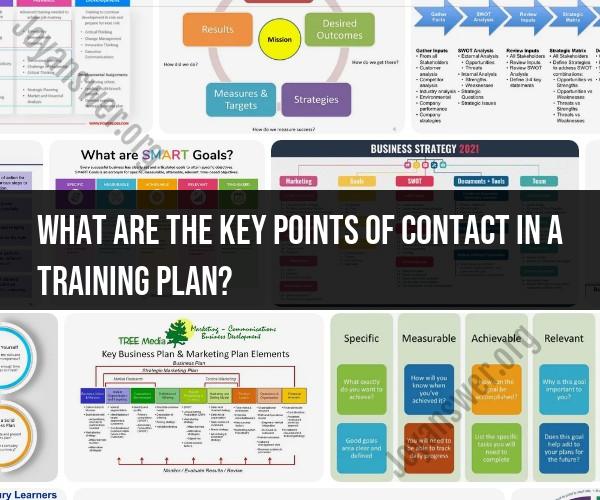What are the key points of contact in a training plan?
In a training plan, various key points of contact play essential roles in coordinating and delivering the training effectively. These individuals or groups are responsible for different aspects of the training program. Here are the key points of contact commonly found in a training plan:
Training Manager or Coordinator:
- The training manager or coordinator is responsible for overseeing the entire training program. They plan, organize, and manage the training activities, ensuring that the program aligns with organizational goals and objectives.
Trainers or Instructors:
- Trainers or instructors are subject matter experts responsible for delivering the training content. They should have expertise in the topics being taught and the ability to communicate effectively with participants.
Participants:
- Participants are the individuals who receive the training. They play a crucial role in the training plan as they are the ones expected to learn and apply the knowledge and skills provided during the program.
Supervisors or Managers:
- Supervisors or managers of the participants may need to support the training effort. They can provide feedback, monitor progress, and help facilitate the application of newly acquired skills on the job.
Human Resources (HR) Department:
- HR may assist in various aspects of the training plan, including participant enrollment, tracking attendance, and managing training records. They may also provide input on training needs assessments.
IT or Technical Support:
- For technical training programs, IT or technical support personnel may be involved in ensuring that the necessary equipment, software, and technical resources are available and functioning properly during training sessions.
Training Support Staff:
- Support staff, such as administrative assistants or training coordinators, help with logistics, scheduling, and administrative tasks related to the training program.
Subject Matter Experts (SMEs):
- SMEs may be called upon to provide input on the training content, validate the accuracy of materials, or participate as guest speakers or presenters for specific topics.
Evaluators:
- Individuals responsible for assessing the effectiveness of the training program through evaluations, surveys, and feedback analysis.
External Training Providers:
- In some cases, organizations may collaborate with external training providers or consultants to deliver specialized training programs.
Safety and Compliance Officers:
- In industries where safety and compliance training are critical, safety officers or compliance experts may oversee and participate in training activities.
Legal and Compliance Teams:
- Legal and compliance teams may review and approve training content to ensure it adheres to legal and regulatory requirements.
Financial or Budget Managers:
- Those responsible for managing the budget for the training program, including allocating funds for training materials, facilities, and resources.
Quality Assurance or Continuous Improvement Teams:
- Teams focused on quality assurance may ensure that training meets established standards and that improvements are made as needed.
Feedback and Grievance Handlers:
- Individuals or teams responsible for addressing participant feedback, concerns, or grievances related to the training program.
The specific roles and individuals involved can vary based on the nature and scope of the training plan, the organization's structure, and the training objectives. Effective coordination and communication among these key points of contact are essential for a successful training program.












